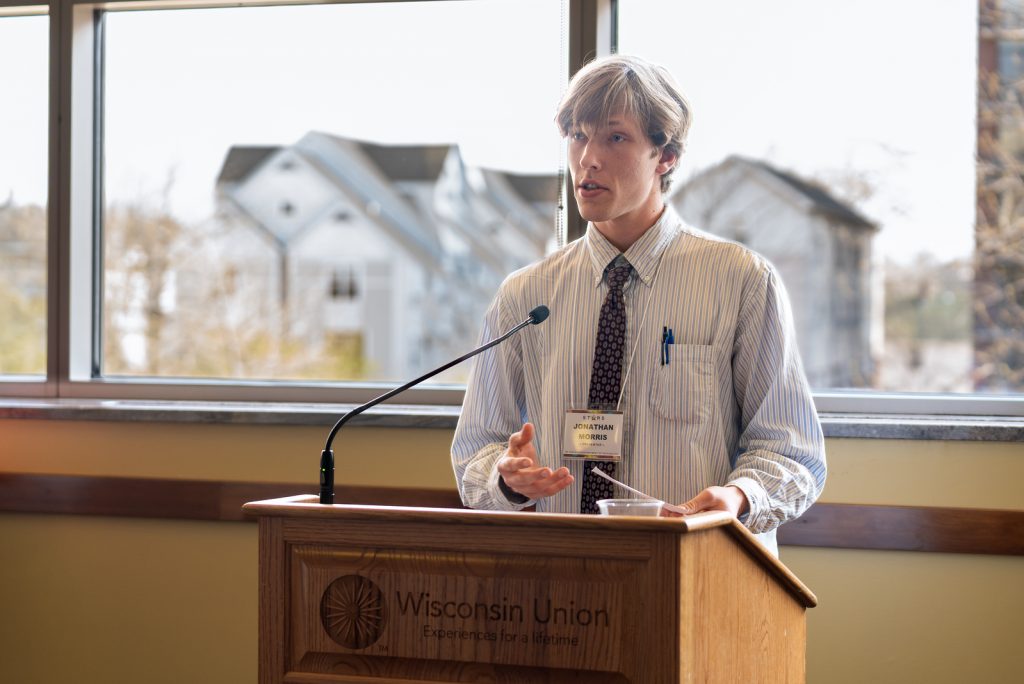
Psychology student Jonathan Morris X’26 will help researchers at the McGill University Department of Physiology in Montreal, Canada, investigate how fluctuations in heart rate relate to brain health as a Fulbright Canada-Mitacs Globalink research intern this summer.
The research aims to answer the question: How do differences in heart rate and heart rate variability associate with differences in brain activity and health?
Morris’ travel and housing in Montreal will be co-funded by the Fulbright program, a United States educational and cultural exchange program, and Mitacs, a Canadian nonprofit research organization. Morris looks forward to building experience in an area of research that approaches topics from a related but different angle than the labs he has worked in as an undergraduate research assistant, including the Center for Healthy Minds, Midlife in the U.S. (MIDUS) Affective Neuroscience Project, and, recently, statistics professor Karl Rohe’s Lab, which researches statistical biases in medical literature.
“I’m really excited to bring the skills and tools that I’ve spent so much time developing at Madison and apply them to this new project, and also to meet new people,” Morris says.
The project will utilize resting state functional MRI (fMRI) data, which tracks blood flow to measure activation in different parts of the brain. Morris’ work will investigate how fluctuations in heart rate are associated with fMRI activity. His research will test to what extent differences in the time interval between successive heart beats might explain differences in brain activity during rest. Morris will focus primarily on the statistics used to analyze data throughout the research process, drawing on his double major in Statistics and Psychology.
Morris decided to apply for the internship at the end of last summer, uncertain of his chances for acceptance to the competitive program but interested in the opportunity to engage in research and travel to Canada.
“I just applied, thinking that there’s no way I would get it … and then things just sort of unfolded,” Morris says. “When I found out I got the Fulbright, I was really close to accepting another job in Chicago, but the Fulbright just ended up being the best thing for me.” Seven students and 11 faculty and administrators from UW–Madison accepted Fulbright awards for the 2024-2025 academic year.
After dedicating much time to the thesis he completed during the 2024-2025 school year, Morris looks forward to traveling abroad. His thesis, conducted under the mentorship of MIDUS Affective Neuroscience Project Principal Investigator Stacey Schaefer, investigated how people emotionally recover from encountering negative information and negative experiences.
Morris’ thesis specifically explored how differences in emotional recovery might be associated with differences in an individual’s ability to spend time on work and other cognitively and physically demanding activities throughout life. Using data collected through the MIDUS project, Morris applied new statistical techniques to gain a deeper understanding of the trajectory of this relationship over time.
“Seeing a project unfold from start to finish is one of the most impactful things that you can experience as an undergrad,” Morris says. “You see how many roadblocks can arise, how things aren’t as clean as you hoped… I also think getting feedback from someone as caring and intelligent as Dr. Stacey Schaefer was really helpful.”
Morris first came to campus with the intention of pursuing a PhD in clinical psychology after undergrad. As he became involved in research and took an introductory statistics course for R, a programming language used for statistical analysis, his interest in statistics grew.
“What I like about statistics is that knowing how to perform rigorous statistical tests [allows you to] work on a wide variety of projects within psychology or neuroscience and support various endeavors without being super content-specific,” Morris says.
Morris plans to graduate with majors in Psychology and Statistics and certificates in History and Math in Spring 2026. He encourages other undergraduate psychology students to take Psychology Professor Nick Buttrick’s cultural psychology course and complete a thesis, as he did under the mentorship of Psychology Professor Trish Devine through the psychology department’s thesis course.
“The research I have been involved in has been really, really helpful,” Morris says. “I’ve been so lucky to work in two research labs, both with incredible mentors who have challenged me a lot and pushed me.”
As Morris completes his undergraduate coursework this fall, he plans to apply to statistics and biostatistics graduate programs for the following year.